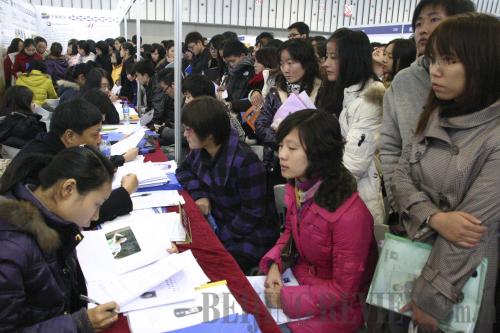|
 |
|
PRIMARY CONCERN: For many college seniors, the fourth year means shuttling around various job fairs, while books are something far from their minds (DONG JINLIN) |
Equality in Education
China's minister of education said recently that his ministry would focus more on balanced development of compulsory education and setting a timetable to achieve the goal.
The program is aimed at balancing investment in the building of academic facilities, staff training and teaching quality improvement in primary and middle schools that are compulsory, as well as ensuring all students receive fair education.
After decades of efforts, the Chinese Government has made parents and students around the country understand the importance of compulsory education—and, as a result, the enrollment rate of primary school-age and middle school-age children reached 99.15 percent and 95 percent, respectively, in 2005.
But there still are severe disparities between developed and underdeveloped regions, urban and rural areas, and even different schools in the same province or city. Students are still not treated equally when it comes to compulsory education.
There are historical reasons behind the disparities. Since the late 1970s, the development of China's education system has followed the trajectory of economic growth and certain regions have developed more quickly. This has caused an unbalanced distribution of educational resources.
For the past few decades, we have accorded priority to efficiency. But now we have to shift the emphasis to fairness, especially in education.
Individual development is not possible without education. Research shows equal and fair education is not only a potent way of bridging the rich-and-poor gap, but is also conducive to strengthening social integration. So, for the sake of the country, the government should take steps to realize equality in education.
Changjiang Daily
Young Gangsters
Since the beginning of 2006, the Ministry of Public Security has launched seven intensive nationwide campaigns against mafia-type gangsters. Though people are excited about the crackdowns, organized crime hasn't shown obvious signs of lessening its activities.
We have to look into deteriorating living conditions of many poor youth to understand organized crime's appeal. Too many young people, especially the children of migrant workers, are pushed into evil ways by harsh realities and become involved in organized crime.
Due to the massive influx of migrant workers to cities, more and more of their children are now in their 20s. They receive poor education, making it harder for them to find a job, which makes them further embittered toward society.
When they feel that life is cheap, joining the high-risk but high-return world of organized crime becomes their only option.
When this group grows bigger, no crackdown will work, because we are dealing with desperados created by our own society.
Gangsters won't go away if we don't eliminate discrimination, create equality in education and equal working opportunities.
Building a social security system is the only solution.
Yunnan Info Daily
Short-sighted Colleges
With the approach of graduation, college students are busy hunting for jobs, but their efforts to find work are starting not in the present but from the beginning of the fourth college year. As colleges place too much emphasis on the importance of workplace experience, graduation projects and academic papers, students spend very limited time studying during their final year. As they enter the fourth year, almost all college seniors' focus is on finding temporary employment and, in some schools, the four-year system is cut to three. This practice actually not only reduces students' time studying but also degrades the employment environment.
It's true that classrooms are not the only place for students to attain knowledge, but this should not be an excuse for students to give up studying almost totally during the fourth year.
If schools are to really stress workplace experience, they need to work out a set of effective practical courses and guide students through them. But currently colleges simply cut required courses and turn a blind eye to students' absence from classes.
When rushing to push students into society, colleges are not being responsible for their students. Even if students by chance become employed, limited knowledge may hinder further development. As a result, future students will find it even harder to get good jobs.
China Youth Daily
Common Sense Needed
In Hefei, capital city of east China's Anhui Province, the local urban management bureau recently employed 100 new officers, most of whom are bachelors, with 11 holding master's degrees.
It's great that these officers have advanced education, but their personal quality will not necessarily enable them to tackle the thorny problems existing between street vendors and urban management officers. In the current social context, conflicts between the two groups are unlikely to be reconciled. Faced with street vendors who have been removed again and again but who always come back, officers will feel annoyed—while vendors hate them.
By now, we have seen a lot of regulations to improve the situation, but none of them help standardize urban management officers' regulatory practices. The question is not how academically accomplished the staff are, but whether the urban management system is rational and effective. If the system works, the conflicts between urban management officers and street vendors will easily become solvable.
The Beijing News | 